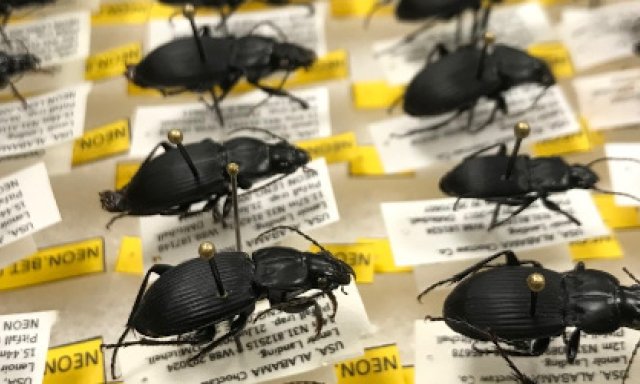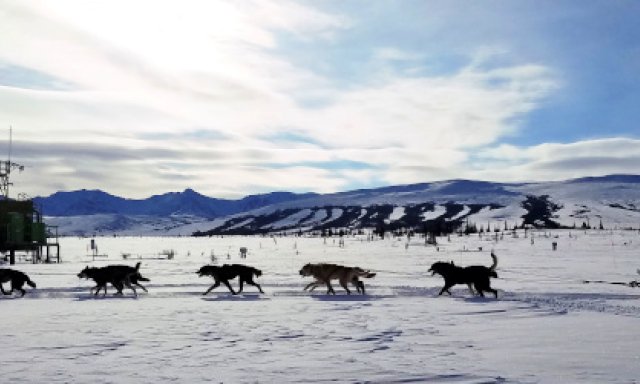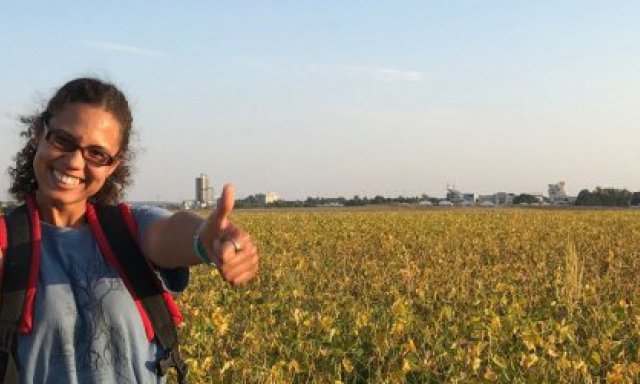NEON at AGU 2024
Visit us in the AGU Exhibit Hall at the Battelle Booth!
The National Ecological Observatory Network (NEON) is a continental-scale ecological observation facility funded by NSF and operated by Battelle. NEON collects and provides open data and samples from field sites across the U.S. to characterize and quantify how our nation's ecosystems are changing. The comprehensive data, spatial extent, and remote sensing technology provided by the NEON program contribute to a better understanding and more accurate forecasting of how human activities impact ecology and how we can more effectively address critical ecological questions and issues.
NEON data and resources are freely available to enable users to tackle scientific questions at scales not accessible to previous generations of ecologists. The Observatory includes 81 field sites (47 terrestrial and 34 aquatic) located in different ecosystems across the United States (including Alaska, Hawaii, and Puerto Rico). Data collection methods are standardized across sites and include automated instrument measurements, observational field sampling, and airborne remote sensing surveys. Field sites are strategically selected to represent different regions of vegetation, landforms, climate, and ecosystem performance. The NEON data catalog includes over 180 data products. The Observatory also archives biological, genomic, and geological samples, available upon request and curated by the NEON Biorepository at Arizona State University.
NEON is part of a bold effort to:
- Understand and forecast continental-scale environmental change
- Inform natural resource decisions
- Engage the next generation of scientists
Join us! What questions will you answer?
Explore the AGU Meeting Website
Fall MeetingGet started with NEON!
learn moreMore science videos
These videos give a better understanding of the NEON program, explain data collection techniques, and explore scientific concepts related to ecological data. Many of them are short, engaging animated videos that teach key data concepts and tell ecological stories using data and are perfect for adding to presentations and classroom discussions.
Events involving NEON staff at AGU
All times are Eastern Standard Time (CST) (UTC-5).
Check back for updates!
Oral Talks / Sessions
IN42A-03 Preparing Ecological Data for Artificial Intelligence (AI) Enhanced Research (Invited)
NEON author: Samantha Weintraub-Leff, Christine Laney
Thursday, 12 Dec - 10:40-10:50. Liberty I-K (Marriott Marquis).
B51C-03 Site to continental scale patterns in the biomass and chemistry of fine roots
NEON author: Samantha Weintraub-Leff, Courtney Meier
Friday, 13 Dec - 8:50-9:00. 149 A-B.
Town Hall
TH23F - Supporting the NEON User Community: Highlights and Updates from Research Support and Assignable Assets
NEON hosts: Rommel Zulueta, Michael SanClements
Tuesday, 10 Dec - 12:30-13:30. Salon A.
Posters
Leveraging the National Ecological Observatory Network (NEON) and Machine Learning to Model Wildfire Risk
NEON authors: John Musinsky, Tristan Goulden, Cove Sturtevant
Monday, 9 Dec - 8:30-12:20. Poster Hall.
Maximizing ecological data utility for addressing real-world applications
NEON authors: Dave Durden, Chris Florian, Adam Young
Monday, 9 Dec - 8:30-12:20. Poster Hall.
Lessons Learned for Sensor Networks From NEON's Data Quality Program
NEON authors: Kyle Jones, Teresa Burlingame, Adam Young, Cove Sturtevant, Dave Durden, Caleb Slemmons, Jill Pyatt, Chris Florian
Monday, 9 Dec - 8:30-12:20. Poster Hall.
NEON Remote Sensing Data in Google Earth Engine
NEON authors: John Musinsky, Bridget Hass, Tristan Goulden
Wednesday, 11 Dec - 8:30-12:20. Poster Hall.
Scaling Opportunities between NEON Remote Sensing and NASA EMIT Hyperspectral Data
NEON authors: Bridget Hass, John Musinsky
Thursday, 12 Dec - 8:30-12:20. Poster Hall.
NEON provides a variety of resources to support researchers, educators, and students in using NEON data including:
Data Tutorials
Looking to improve your data skills using specific tools like R or Python? Want to learn more about working with a specific NEON data product?
NEON develops online tutorials to help you improve your research. These self-paced tutorials are designed for you to used as standalone help on a single topic or as a series to learn new techniques.
Teaching Modules
For educators, NEON provides Teaching Modules that include lesson outlines, curated datasets, and data skills activities to teach essential ecological concepts with accompanying data skills. Teaching modules are cross-listed on QUBES Hub and through other collaborating projects.
We welcome inquires from instructors interested in using NEON data in their own classrooms.
Workshops
Workshops can range from a few hours to a week and teach specific skills and provide more insight into NEON data.
NEON workshops are posted on our Upcoming Events page. You can browse our upcoming workshops here, and also find links to past workshops and recorded events. Contact us with any questions about our workshops and trainings.
Information for Researchers
This page includes a variety of information to help researchers plan their research and submit proposals to funding agencees, including the National Science Foundation. Topics include AOP flight schedules and interannual observational sampling schedules, site access guidelines, how to request a letter of support and how to request an assignable assets.


